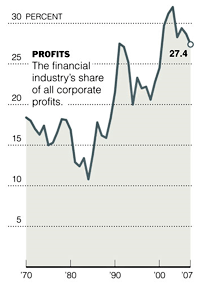PETTY AND CHILDISH….Matt Stoller passes along an email about the Wall Street bailout from “a lawmaker”:
I also find myself drawn to provisions that would serve no useful purpose except to insult the industry, like requiring the CEOs, CFOs and the chair of the board of any entity that sells mortgage related securities to the Treasury Department to certify that they have completed an approved course in credit counseling. That is now required of consumers filing bankruptcy to make sure they feel properly humiliated for being head over heels in debt, although most lost control of their finances because of a serious illness in the family. That would just be petty and childish, and completely in character for me.
Hey, nothing wrong with petty and childish! There’s a time and place for everything.
But while we’re on this subject, one of the popular memes making the rounds right now is that in return for bailing out Wall Street, we should institute draconian restrictions on executive compensation in the financial industry. I’m skeptical. Any rule you can make, the rocket scientists will eventually figure a way around. Besides, I’d rather try to attack the root cause: compensation for these guys is astronomical because the finance industry itself has become so astronomically profitable, as the NYT chart on the right shows. But it’s a mystery why this should be. After all, as finance becomes ever more efficient, as it has over the past few decades, arbitrage opportunities should get thinner and the industry should get more competitive. This should reduce profit margins and overall profitability — and aggregate bonus payouts along with it — shouldn’t it?
The reason it hasn’t appears to be a combination of fraud, vastly increased leverage, asset bubbles, and the increasing use of finance-for-the-sake-of-finance to tap into the global savings mega-glut in any way possible — regardless of whether the investment vehicles are of any real-world use or not. I may be off base here, but it strikes me that if the industry is properly regulated, reducing allowable leverage ratios and forcing managers back to using finance as a tool to provide capital to actual businesses, rather than as an end in itself, this would go a long way toward reining in compensation in a way that’s more robust than artificial rules. Add in mortgage reforms, a legislative mandate (with regulatory teeth) for the Fed and the Treasury to pay more attention to asset inflation, and higher tax rates on extremely high incomes, and not only would compensation packages become halfway reasonable, but we’d actually reduce the insane bubble psychology that prompted the current collapse in the first place.
Can this be done? Would it work? I don’t know, but I’d like to hear more about it from people who understand the intricacies of modern finance. But the bottom line is that skyrocketing compensation is a symptom of the problem, not the problem itself. So why not attack the problem directly?
















